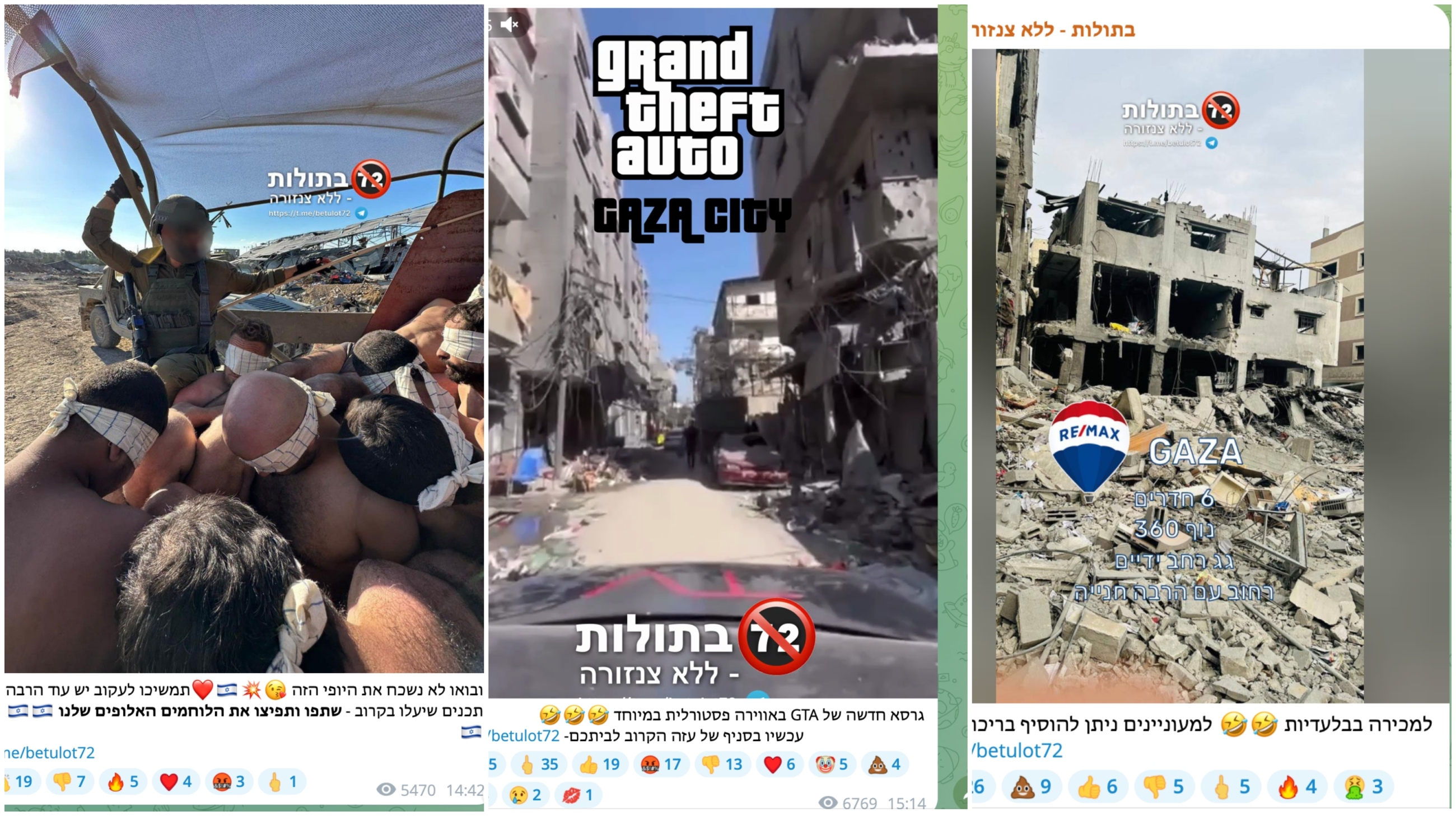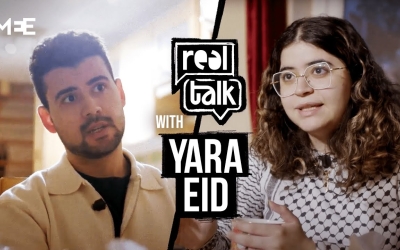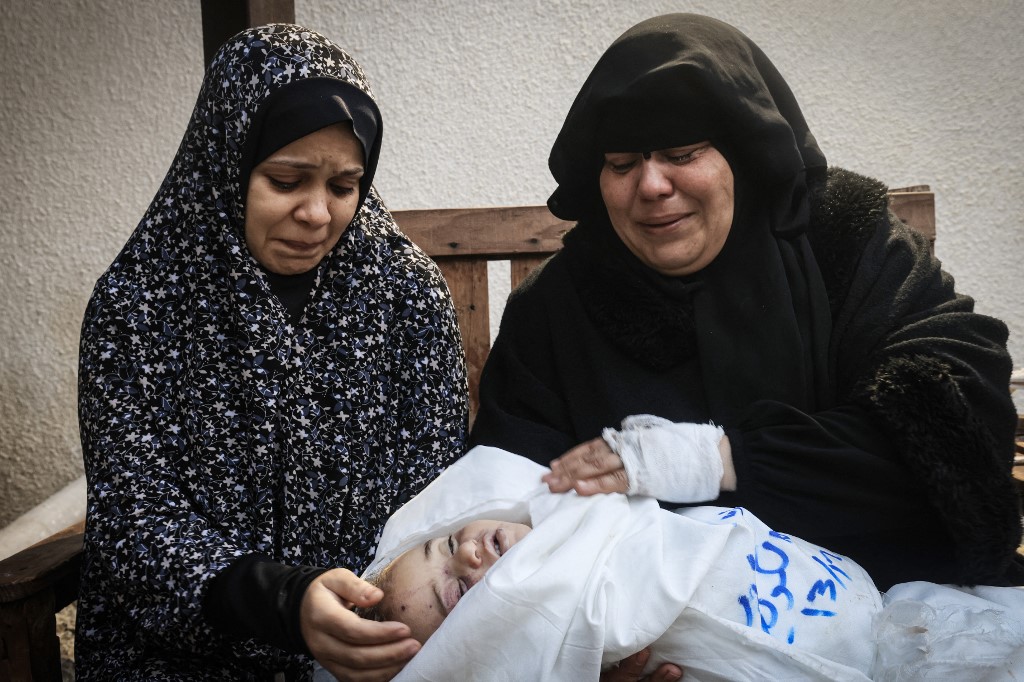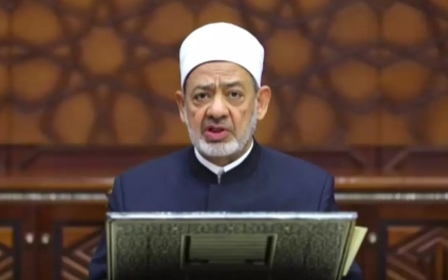Israel-Palestine war: How an Israeli Telegram channel is used to incite violence against Palestinians

A Telegram group created on 9 October by the Israeli army’s Influencing Department, which regularly shares violations against Palestinians, has been denounced as a form of "psychological warfare" and a tool for fuelling violence.
The channel, which now has over 10,500 subscribers was originally titled "The Avengers," and was changed a day later to be named "Azazel", to sound like the Hebrew pronunciation for Gaza, and a word for "hell".
The title was later changed to "72 virgins uncensored".
The channel has posted over 700 photos and videos showing graphic violations against Palestinians and destruction of civilian areas and buildings, promising their viewers of “shattering the terrorists’ fantasy” and showcasing “exclusive content from the Gaza Strip”.
Middle East Eye has contacted the Israeli army and Telegram for comment.
New MEE newsletter: Jerusalem Dispatch
Sign up to get the latest insights and analysis on Israel-Palestine, alongside Turkey Unpacked and other MEE newsletters
According to Haaretz, the Israeli army has denied that it operates the channel, but a senior military official confirmed to the paper that the army is responsible for operating it.
Some of the messages in the channel encourage people to share the content so that everyone can “see that we’re screwing them”.
‘You can hear the crunch of their bones’
In some of the posts seen by Middle East Eye on the channel, Palestinians are being mocked and abused.
The channel was created in the aftermath of the deadly Hamas-led attack on Israel on 7 October, which killed 1200 people, most of them civilians. The assault was followed by heavy Israeli bombing of the Gaza Strip, killing over 18,700 mostly Palestinian civilians and damaging or fully destroying at least 40,000 buildings.
In one example on the channel, a doctored photo shows a carousel and theme park in the middle of a destroyed neighbourhood in Gaza’s Khan Younis.
Another post from 11 October, reads: "Burning their mother...you won't believe the video we got! You can hear the crunch of their bones. We'll upload it right away, get ready."
New posts are published daily on the channel, with the moderators often encouraging people “to get ready” for their upcoming post, which are described as “hilarious” or “worth waiting for”.
A caption of a bombed-out kitchen in a Gaza home, which read “this apartment has a spacious and fully equipped kitchen,” elicited laughing and fire emoji reactions from subscribers.
Another post shows a photo of a Palestinian man sitting distraught in his bombed-out home, with the caption “for sale in Gaza, a stunning penthouse with air coming in from four ways”.
Viewers are also encouraged to share the posts widely in an effort to "raise morale".
One such caption reads: “Gaza is flattened, must be heard with sound. Share and spread, together we will raise the morale of the people of Israel.”
Racist language and imagery are also constantly used in the channel.
Images of two Palestinian men are defaced to make them look like pigs, with the caption stating “Here we see the al-Qawsami brothers, who we are sure their mother (who probably conceived them with her brother) is very proud of her breathtaking two roaches.”
‘Genocidal' rhetoric
Marwa Fatafta, the policy director for Access Now, a digital rights organisation, said that the rhetoric on the channel can have dangerous consequences.
“The history of past genocides and atrocities has taught us that words can be fatal. Depicting Palestinians as less human - as "human animals," "roaches," or "rats" - serves to justify and tolerate abhorrent crimes and violence inflicted on them,” she told Middle East Eye.
“This type of content feeds into the Israelis' strong lust for revenge after the 7 October attacks and can perpetuate endless cycles of violence,” she added.
According to Fatafta, more needs to be done to tackle the spread of “genocidal rhetoric and the dehumanisation of Palestinians” on such Telegram channels.
“This should turn on sirens within tech companies; after all, this is an army that not only has the intention but also the means to commit genocide. But so far companies have been dismissive, allowing this content to go rampant on their platforms,” she said.
“Telegram, in particular, has become the go-to app for terrorists and extremists. Yet, the company continues to operate outside the realm of transparency and human rights.”
'A hotbed for hate speech’
Jalal Abukhater, a Palestinian writer from Jerusalem and the advocacy manager at 7amleh, a non-profit organisation advocating for Palestinian digital rights, said that Telegram is "notorious" for its policy of not moderating any content.
“[Telegram] has been a hotbed for hate speech and incitement to violence against Palestinians,” he told Middle East Eye.
According to Abukhater, 7amleh has documented a number of Telegram channels that are openly calling for genocide and collective punishment of all Palestinians since hostilities started on 7 October.
In the channels, moderators post the addresses of Palestinians, community gatherings, and marches, calling on subscribers to plan attacks, with Telegram refusing to take the posts down.
“Those channels are abhorrent and must not be allowed to continue promoting hateful rhetoric that dehumanises Palestinians and justifies their collective punishment, even if they are being run by the Israeli military,” he said.
7amleh has recorded an uptick in hate speech targeting Palestinians online since 7 October, with their AI-powered language model Violence Indicator documenting over 2.3 million such instances across several online platforms, predominantly on X, formerly known as Twitter.
Abukhater says this can be seen as a “reflection of incitement and inflammatory rhetoric stated by Israeli government officials and military leaders in their official capacity.
“While we are not surprised the Israeli army is involved in propagating harmful content online…we reiterate our demand for those companies, including Telegram, to uphold their responsibilities to not allow the spread of such violent content on their platforms.”
Middle East Eye delivers independent and unrivalled coverage and analysis of the Middle East, North Africa and beyond. To learn more about republishing this content and the associated fees, please fill out this form. More about MEE can be found here.







